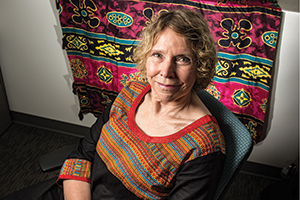November 23, 2015
Marcia Shannon, assistant professor of nursing Crystal M. Lange College of Health & Human Services
 There’s a framed photo in Marcia Shannon’s office showing the assistant professor of nursing flanked by friends, the crests of Mount Everest looming in the background.
There’s a framed photo in Marcia Shannon’s office showing the assistant professor of nursing flanked by friends, the crests of Mount Everest looming in the background.
She points out that the location of the picture is exactly where, years later, someone filmed a video — viewed worldwide — of an avalanche that followed a massive earthquake in Nepal.
“That was scary to watch,” she said.
While Shannon was safe at SVSU during the spring 2015 earthquake, the disaster struck her on a personal level. She has visited the South Asian nation six times, including twice while leading a group of SVSU students on study-abroad trips.
“Nepal is very near and dear to my heart,” Shannon said. “I’ve been going there for 15 years, and I’ve developed a lot of good friendships.”
Seeing the devastation from home, Shannon decided to spearhead a fundraising campaign on campus to support disaster relief and rebuilding. In June, Shannon presented $4,875 in Nepal disaster relief funds to the American Red Cross.
“We had to do something,” she said.
Shannon’s first visit to the nation happened in 1998, when she and her husband spent their 25th wedding anniversary traveling to the base camp of Mount Everest. Most recently, she took a group of 10 SVSU students to Nepal in May 2014. They visited health care facilities, both in highly populated communities such as Kathmandu as well as rural regions. They learned about medical practices and medicines used in that part of the world, and presented studies on non-communicable diseases to audiences that included government officials and academic deans.
The learning goes both ways, Shannon said.
“It’s not just about what we bring to these trips,” she said. “There’s so much to learn from these countries, too.”
Shannon hasn’t limited her students’ study abroad experiences to Nepal. Since arriving at SVSU in 1978, she led academic expeditions to Cambodia, China, Indonesia and Vietnam.
“There’s great value to service learning and study abroad,” Shannon said. “I wish more students would take advantage of that.”
She stressed the importance of understanding other cultures even domestically, considering the growing percentage of minority populations in the United States.
“If you can’t see what others are seeing, you’re missing out,” she said. “I haven’t had a single student go on one of these trips and say, ‘I haven’t been changed.’ That’s what I want to do for students: open up the world for them.”
